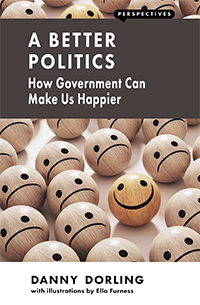The aim of this book is to inspire a better politics: one that will enable future generations to be happier. While its publication coincides with the 500th anniversary of Thomas More’s Utopia, its proposals are not a Utopian wish-list. They are, crucially, a set of policy suggestions that are already in place (or are being tested) elsewhere in Europe; proposals that address the issues that appear to matter most to people in the UK.
In the immediate aftermath of a global financial crash it is hard to imagine great progress, as it also was after the crash of 1929. What I suggest here is in many ways much less imaginative than setting up a National Health Service would have sounded in 1935, or the suggestion also made at that time that full employment was possible in the near future – but both of those things happened.
Most of the policy proposals I put forward are not fully polished. Some might turn out to be unworkable, while others may not seem bold enough with the benefit of hindsight. None of us can know for sure what proportion of what we suggest will turn out to be misguided, or where we might have hit the nail on the head. That is often only apparent in retrospect.
What is certain is that there is no shortage of evidence, ideas and choices for us to consider if we wish to. There are many policies that we could adopt if we really want to be collectively happier and healthier. We could have a government that makes our lives happier, if we win the argument for it.
Browse the following sections to find out more about the book and related additional content:
- Material (Figures, Tables and Data)
- Multimedia (Video content)
Published in the Perspectives series of London Publishing Partnership
Perspectives are essays on big ideas by leading writers, each given free rein and a modest word limit to reframe an issue of great contemporary interest. – Diane Coyle, Series Editor
Endorsements
‘The thing that is lacking in the often machine-like short-term tactics of British politics is any vision of what we could be as individuals and as a nation. Danny Dorling makes simple arguments for a better society – ideas that are grounded in practical idealism and backed up with intelligent interpretation of evidence and data.’
From the foreword by Lord Victor O. Adebowale, Crossbench Peer
‘Starting from the very reasonable view that public policy should concentrate on what would further our well-being, Dorling argues for a provocative range of policies. This is a useful corrective to the focus on measured economic growth, which can all too readily dominate our thinking; these ideas deserve further debate.’
Dame Kate Barker, Former member of the Bank of England’s Monetary Policy Committee
‘In The Argumentative Indian, Amartya Sen encourages us to consider the traditions, contributions and shared humanity of people like us who are different – Danny Dorling has done that for me.’
Sir Peter Bottomley, Conservative MP and former minister
‘A formidable intervention into current political debate.’
Anthony Giddens, Former Director of the LSE
‘What matters most, what makes us happy, and what, if anything, governments can do to help us thrive are vital questions. Some of the answers around money and housing are admirably clear. Others are unavoidably complex – governments will always struggle to influence our relationships. But no one will read this book without finding new insights and inspiration.’
Geoff Mulgan, Chief Executive of Nesta
‘Whether one leans left or right, this is a remarkably engaging book. Dorling is ahead of his time in blending common sense with an emphasis on the use of objective evidence about societal happiness.’
Andrew Oswald, Professor of Economics, University of Warwick
‘One sentence captures Danny Dorling’s argument ‘we are not focussing enough on the issues that make us most unhappy in this most unequal of affluent societies’. By the end of reading this lucid, data rich and engaging book it is impossible to disagree.’
Matthew Taylor, Chief Executive, RSA
‘This lively and accessible book is a wake- up call to anyone involved in public policy. It reminds us that happiness, and love, are terms too rarely mentioned, and even less frequently measured, and yet they are at the heart of what makes a good society. Politicians, policy makers and practitioners could all benefit from asking the central question – what can be done to make us happier? Danny Dorling challenges, and informs, and does so in a way that makes the reader think again about what really matters.’
Julia Unwin, Chief Executive of the Joseph Rowntree Foundation
